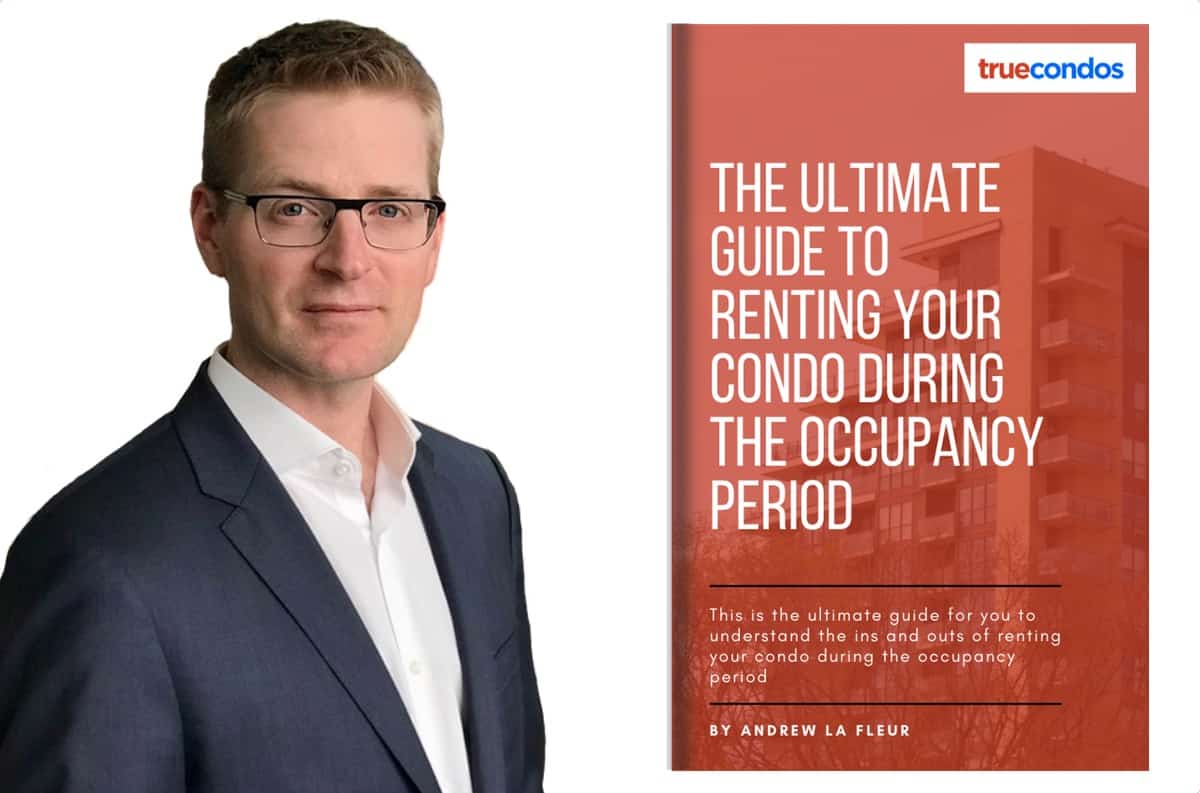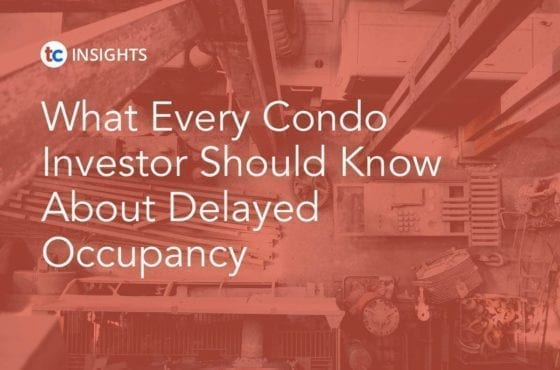The Ultimate Guide to Renting Out Your Condo During the Occupancy Period

So you’re an investor, you just got your keys for your brand new condo, and now you want to rent it out.
Not so fast! In Ontario, every new condo has what is called an occupancy period before you actually own the unit.
As an investor, there are several things that you will need to know before you throw up the “FOR RENT” sign.
Listen to the podcast episode
Renting your condo during occupancy can be confusing for first time investors – how do you do it? What is allowed? What is required of you? The process has changed quite significantly over the years, find out what you need to know on this episode.
This is the ultimate guide for you to understand the ins and outs of renting your condo during the occupancy period.
Table of Contents
1. What is the Occupancy Period?
2. What Are Occupancy Fees and Why Do You Have to Pay Them?
3. Are Occupancy Fees a Tax Deductible Expense?
4. Are You Even Allowed to Rent Out Your Condo During Occupancy?
5. What if the Developer Refuses to Give Permission to Lease During Occupancy?
7. Should I Just Wait Until Final Closing to Rent Out My Condo?
10. Where Can You Advertise Your Unit for Rent During Occupancy?
11. Should You Rent Out Your Condo by Yourself or Hire a Realtor?
12. Is It More Difficult to Rent Out a Condo During Occupancy Than After Final Closing?
14. Occupancy Sounds Like a Big Headache, Is There Anyway I Can Avoid It Altogether?
15. Is There Anything Extra You Should Do to Your Condo Before Your Tenant Moves in During Occupancy?
16. Do I Need to Get Insurance When Renting Out My Condo During Occupancy?
17. Do I Need to Set up the Utilities for My Condo in My Name During Occupancy?
18. Conclusion
What is the Occupancy Period?
In Ontario, new condos go through what is called an interim occupancy period (or simply, “occupancy”) before the final closing takes place.
This is a period of time where you have the right to occupy the unit, but you don’t technically own it yet.
This is unique to condominiums and does not happen in freehold properties, which go right to final closing.
You will have your occupancy closing day, where you get the keys for the unit.
Then sometime after, you will have your final closing day where the title actually transfers to you.
What Are Occupancy Fees and Why Do You Have to Pay Them?
There are a lot of misconceptions about occupancy fees.
Many investors fear occupancy fees unnecessarily.
Some people call occupancy fees “phantom rent” which makes it sound scary, but it’s nothing to worry about.
Occupancy fees are not something that a developer can simply “make up” and charge you what they want.
When you pay occupancy fees, you are not “throwing your money away” or paying rent for nothing.
You are paying for the exclusive right to use and occupy the property.
How occupancy fees are calculated is a simple formula that is the same for every condo in Ontario.
Let me explain it simply like this: when you own a condo, you pay 4 things every month: condo fees, property taxes, and your mortgage payment which consists of 2 parts: principle and interest.
When you are in the occupancy period of your condo, it’s the exact same except you just don’t pay the principal portion of your mortgage each month.
So your monthly occupancy fee payment is typically around 20-30% less than what your monthly expenses will be when final transfer takes place and your mortgage kicks in.
Are Occupancy Fees a Tax Deductible Expense?
Check with your accountant for specific tax advice, however, in most cases, yes, occupancy fees are fully tax-deductible expense against rental income when you are an investor renting out a condo.
Are You Even Allowed to Rent Out Your Condo During Occupancy?
The first step when renting out your condo during occupancy is to find out if you are even allowed to.
That’s right, you might actually not be allowed to rent out your unit.
Hold on, what?!
I’m an investor, and that’s the whole reason why I bought the condo was to rent it out!
When you are in the occupancy period, you don’t technically own the property yet, so the developer has the right to dictate the terms of the occupancy period and your rights as the buyer of the unit.
Once final closing has taken place, you own the unit, and you can do whatever you want with it.
So how do you know if you have permission to rent it out?
You can check your contract to see what it says or consult your lawyer, but the best thing to do is simply ask the developer.
Find out what their policy on rentals during occupancy is and if there are any stipulations or fees.
In 99% of cases, the answer will be yes, you can rent it out, but how and where and by whom, as the details, you will want to understand before going any further.
What if the Developer Refuses to Give Permission to Lease During Occupancy?
In practice, I have never seen a developer completely prohibit renting during occupancy.
There is even one prominent Toronto developer that I have been working with for years that usually does not give written permission to rent during occupancy but they simply turn a blind eye to investors doing so, and it has never been an issue.
Occasionally I have also seen some developers say you can rent it out but only if you use their on-site designated rental agent to lease it.
Overall, developers are putting more restrictions, rules and fees on investors who wish to do so, and I expect this trend to continue.
When I Bought My Condo in Pre-Construction, I Got the “Right to Lease During Occupancy” Clause in My Contract. Do I Still Need to Ask Permission From the Developer?
Yes, you should still consult the developer and ask them what their policies are around renting during occupancy, even if you have the right to lease in your contract.
Over the last few years, the “right to lease during occupancy” clause has become a more common purchaser incentive in condo contracts.
In the old days, developers took a “don’t ask, don’t tell” approach where investors would just put their units up for rent during occupancy, and they would not stop them unless there was some major issue.
Over time, and probably because of insurance concerns, developers have trended towards regulating and controlling the practice.
I do miss the good old days, but I don’t expect things to go back to that way ever again.
Should I Just Wait Until Final Closing to Rent Out My Condo?
I often talk to investors who say that they are waiting because their contract says they can’t rent during occupancy, or their lawyers told them they aren’t allowed.
Investors – don’t do this!
Get permission if you need it, but don’t leave your condo empty!
You are paying fees every month with no income coming in, and most critically, you don’t know when it will end as the final closing date is different for every building and dependent on so many factors that are all out of your control.
Note: the only time you might intentionally NOT rent out your condo during occupancy is if the developer owes you delayed occupancy fees and is asking you to waive them in exchange for the right to lease. (More on this later on in this guide.)
When I Bought My Condo in Pre-Construction, I Got the “Right to Lease During Occupancy” Clause in My Contract. Can the Developer Still Charge Me a Fee for Renting During Occupancy – Is That Even Legal?
Consult your lawyer for advice, but in general, yes, you can be charged fees for renting out your condo during occupancy – even if you have permission in your contract.
The most common fees these days are two-fold: one fee for the simple “right to lease” the unit, and another fee to list your unit on the MLS system.
Yes that’s right, you can be charged more than one fee.
Or sometimes you are not charged anything.
It simply depends on the developer.
Fees vary, but I have seen fees recently from $1500-$4000.
Certainly, try to get it explicitly written in your contract that there will be a $0 fee for renting during occupancy, but there’s very little chance of any developer agreeing to that clause.
The Developer Says I Must Waive My Right to Delayed Occupancy Claim in Order to Rent Out My Unit, Should I Agree to That?
Delayed occupancy claims are a billion-dollar expense for developers in Ontario.
Delayed occupancy is a program under TARION that basically says that if your condo occupancy is delayed past a certain point, OR if you are not notified in the exact proper way of occupancy delays, that you are entitled to compensation for the delays.
The maximum compensation under this program is $7500.
Most condo investors still don’t know this program even exists in Ontario.
I have heard of some condos where developers have had to pay upwards of $7m in delayed occupancy claims to purchasers – this comes straight out of their profits, and in some cases, this is nearly ALL of a project’s profits.
Recently developers have realized that they can get out of paying them and potentially save themselves millions of dollars by simply forcing condo investors to waive their rights to them in exchange for renting during occupancy.
In general, I believe that developers are not savvy enough to figure out how to avoid the claims altogether by following the TARION rules more exactly.
So the question of if you should agree to waive your rights to a claim or not – you just need to do some simple math and figure out if it’s worth the potential rental income (and hassle) of renting out your unit.
For example, if you bought a studio on the penthouse floor of a condo, and you are owed $7500 in delayed occupancy fees by the developer, it’s not worth waiving your rights.
Your occupancy period since you are high up is going to be very short, and your rental income on a studio is going to be relatively low.
In this case, you’re better to leave it empty until final closing and take the $7500 delayed occupancy claim instead.
However, if you are a 2 bedroom unit on the 2nd floor of a 50 storey tower, and you are owed $2000 in delayed occupancy fees, you’re better to waive your right to delayed occupancy.
In this case, you’re looking at probably 9 months of occupancy fees to pay, and your potential rental income each month is a lot, so you suck it up, waive the rights to delayed occupancy claim and get it rented ASAP.
For more information about delayed occupancy claims and to find out if you have one, listen to this podcast
Where Can You Advertise Your Unit for Rent During Occupancy?
The most powerful place to advertise a condo rental in Toronto still remains the MLS system which is only accessible by Realtors.
This is why most investors hire an agent to list their condos for rent – to get that premium MLS exposure.
The MLS goes to Realtor.ca, and the data also is scraped and sent to thousands of other websites.
We do help investors every month rent out their condos all across the Greater Toronto Area.
Typically we charge 1 months’ rent for the service of finding a tenant on a 12-month lease.
If you would like to learn more about our rental service, please contact us.
The list of other popular sites is always changing, but as of the time of this article, Zumper/Padmapper is probably the best place to advertise.
Facebook Marketplace is also a very popular place to find tenants in Toronto for landlords.
Other sites include Rentals.ca, Kijiji, and to a lesser extent Craigslist.
Should You Rent Out Your Condo by Yourself or Hire a Realtor?
This is a personal choice, but most investors prefer having a Realtor or property management company lease out their units during occupancy (and after final closing too).
You really have to determine a) what your time is worth and b) how confident you are that you won’t mess anything up.
Most investors hire an agent because the fee is nominal compared to the amount of potential time and hassle involved, and to avoid any potential mistakes.
Our team has leased out hundreds of units.
Most investors only lease out a unit once every couple of years.
There are many things that can potentially go wrong if you don’t know what you are doing.
Hiring an expert only costs you a little.
Not hiring an expert can cost you a lot more!
Still prefer to rent out your investment condo by yourself? We have a guide for that too.
Want to hire us to rent out your condo? Contact us today.
Is It More Difficult to Rent Out a Condo During Occupancy Than After Final Closing?
When you rent out a condo in a building that is still in occupancy, the building is under construction, and the amenities and common areas are typically not finished yet.
The unit itself is often not even 100% finished.
Also, there are many other investors getting their keys at the same time, and it’s common for a large number of rental units to hit the market in the building at the same time.
For these reasons, you can typically expect rents to be a little lower in a building that is in the occupancy period than a building that is fully finished and established.
You can also expect the time to find a renter to be a little longer than it will be in subsequent years when there are only a handful of units available in the building at any given time.
My Building Is Under Construction So I Have to Rent My Unit for Less Than Market Value, Can I Increase the Rent Later?
In Ontario, there is no rent control on any new condos that were occupied for the first time on November 15, 2018 or after.
This means that as investors, we have the legal right to increase the rent by any amount you wish as long as proper notice is given, and it is only allowed once per year.
So don’t worry too much about what rent you get at the start, just get it leased as soon as possible so that you are not paying occupancy fees for nothing, and after the term of the lease (usually 12 months), you can increase the rent to market value if you wish.
Of course, you must give proper notice to your tenants, and your tenants of course, have the right to simply refuse the rental increase and move out, which forces you to have to find new tenants, so this has to be considered before you decide what to do.
Always best to have these conversations with your tenants upfront to avoid any problems in the future.
Occupancy Sounds Like a Big Headache, Is There Anyway I Can Avoid It Altogether?
Renting during occupancy is a bit of a hassle, but nothing that cannot be overcome by an experienced investor.
Hopefully, after reading this guide, you are much more informed and comfortable with the concept of renting during the occupancy period, but if you are still looking for a way out of it, here’s what I suggest:
Buy all your pre-construction condos on the highest floors in the building to shorten the occupancy period or eliminate it altogether.
Buildings occupy from the ground up, so if you are on the lowest floors, you will have the longest occupancy period, and conversely, the highest floors will be the shortest.
In some cases, I have purchased units in the top-5% of the tower, and I have had zero occupancy period.
That’s right, the building can register and go to final closing before all units in the building are even ready to occupy.
In this case, you just go straight to final closing, your mortgage kicks in on day 1.
Some builders like Centrecourt Developments, for example, do not have any occupancy period.
They take everyone straight to final closing on the same day.
This is great for eliminating occupancy, but it results in a very high number of rental listings all dropping at once which does tend to drive rental prices down at first.
Is There Anything Extra You Should Do to Your Condo Before Your Tenant Moves in During Occupancy?
One thing many investors forget or overlook is window coverings.
It’s a good idea to get window coverings installed before your first tenant moves in.
I always go with the same thing in my rental units – white vertical PVC blinds.
This is a cheap yet effective solution, and they tend to be quite durable and last many years.
If you need a good blinds installer for your new condo, please contact us.
Do I Need to Get Insurance When Renting Out My Condo During Occupancy?
Yes, you should always get insurance on your condo investments from the day you take occupancy.
Typically you are looking at around $20-30/month for insurance on a rental condo, which of course, is a fraction of the cost of insurance when insuring a freehold property like a house or duplex/triplex.
You will also need to disclose to your insurance if your condo is unoccupied and also let them know when your tenant moves in.
The company I use for all my condo rentals is Square One Insurance.
Need condo insurance? You can get a quote from Square One right here and actually save $10 just for using my link.
Do I Need to Set up the Utilities for My Condo in My Name During Occupancy?
Yes, you will need to set up the utilities in your name as the landlord from the day of occupancy until the day your tenant moves in.
Consult your accountant, but typically utilities on a rental are a fully deductible expense against rental income.
Conclusion
Renting out your new condo during the occupancy period requires some understanding and skill.
With the right team in place helping you, it’s nothing that you, as a condo investor, need to worry about.
If you would like more information, or to learn more about condo investing please check out the many free resources available to you on this website.
Happy Investing!
Andrew la Fleur
Founder, Truecondos.com



